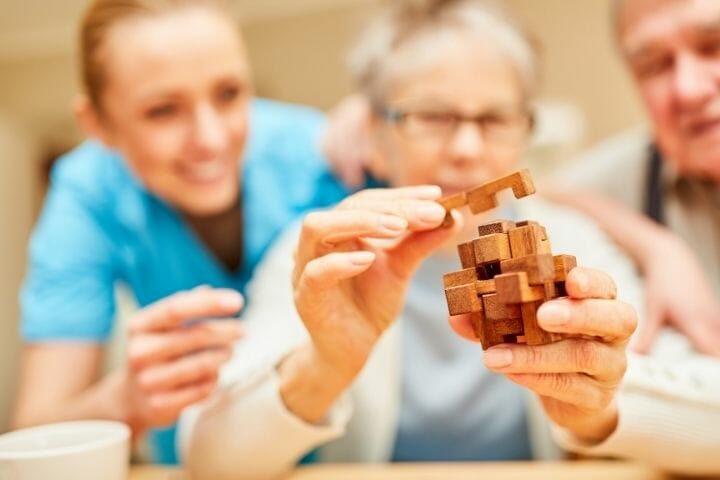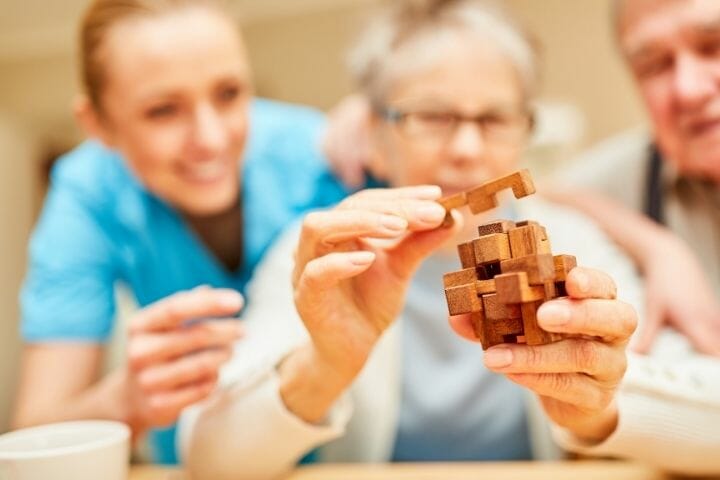Alzheimer’s can significantly diminish the overall well-being of an individual. This guide will show you how can Montessori methods help Alzheimer’s patients and enable you to care for them better.
Contents
Nearly 6mn people in America live with Alzheimer’s every day. This number is likely to go up to 14mn in the next 40 years. The propensity for this disease doubles every five years after the age of 65.
If you are dealing with a loved one with dementia, you may have noticed them gradually growing more detached from human connection. The initial symptoms are very difficult to judge, and a patient may have had Alzheimer’s for many many years before it is finally diagnosed and their treatment can start.

You must not discount their refusal to participate as inevitable or permanent. This withdrawal signals the need for urgent intervention by family and caregivers of the individual.
Thus we bring you a comprehensive guide on the Montessori approach – one of the most effective intervention methods to engage the elderly in a meaningful way. Staying connected with others is proven to reduce the risk of other illnesses, long-term disability, depression, and death among dementia patients.
What is the Montessori Method for Dementia Care?
The Montessori Method of education was initially pioneered in 1897 by Dr. Maria Montessori, an Italian educator to aid special-needs children.
But in the last decade, scientists, researchers, and psychologists surprisingly found this child-centered educational approach bringing positive results in the lives of Alzheimer’s patients. This led to the birth of the Montessori-based Dementia Programming Method, which uncovers the person behind dementia.
The Montessori methods improve the overall cognitive and motor skills of students by initiating simple activities. Active efforts are always made to get to know the patient better and learn their personal history, interests, and abilities to formulate activities and routines that meet their needs.
One of the central tenets of the Montessori Approach is the presence of an environment that continuously adapts to match the individual’s mental state.
The environment must include social cues and signs that trigger correct responses to situations when the person tends to have difficulty remembering. The surroundings should be minimalistic, free of any clutter, and painted in calming color schemes if possible.

Understand the Basis of the Montessori Method
The basis of the Montessori method primarily lies in the principles of :
- Equality
- Independence
- Individuality
- Respect
- Dignity
- Information Absorption
- Zero Judgment
- Social Engagement
The Montessori method aims to fight the assumption that people with Alzheimer’s are no longer fit to learn. It spreads greater awareness that procedural learning and memory remain in good enough shape among dementia patients for recovering lost skills and acquiring new ones as well.
Montessori methods reiterate the importance of treating the elderly with dementia, like aging loved ones without the ailment, to prevent discrimination and alienation.
The Montessori Approach fosters a sense of independence among the elderly with dementia by creating a supportive environment that reveals their ability to complete a diverse range of tasks.
Under the Montessori ideology, there’s no right and wrong in a patient’s actions. It is not the caregiver’s job to correct the individual’s perception. Instead, the caregiver should work their way into the individual’s narrative until they are comfortable enough to open up more.
The methods also ensure that the elderly’s respect and dignity are preserved throughout all the attempts to help them.
Could the Montessori Method help people with Dementia?
While the healthcare system was successful in using traditional memory intervention methods like mnemonic techniques to boost the memory of aging adults. These simple techniques were rendered useless for people with a cognitive impairment like Alzheimer’s’ and Dementia.
Most patients with Dementia are tired of being told what to do and when to do it all the time. Just like all of us, they possess the desire to contribute and be of some use. Thus, the Montessori Methods took note of this feeling and revolutionized dementia care by discarding verbal techniques for a learning model by doing.
Thus, Montessori focuses on improving the quality of life, self-esteem, and self-confidence of those with dementia without resorting to any medication.

How to Use the Montessori Method in Dementia Care
Montessori Methods can be utilized during the entire course of dementia, from the first diagnosis to the final stages. Frontline workers, the individual’s primary medical team of doctors, caregivers, and family, can learn to apply these methods in their sphere of influence.
The Montessori approach consists of exercises that directly stimulate the patient’s five primary senses – smell, taste, touch, hearing, and sight.
Since the individual’s long-term memories are not affected by dementia, the Montessori methods can easily trace back to their earlier life skills and background.
If your aging loved one loved sewing or was a fashion designer, some time can be set aside to be spent with the sewing machine and a set of colorful threads. This time would evoke positive feelings in the individual and push them to reconnect with their past self.
What are some of the challenges of adopting the Montessori Method?
The biggest challenge of adopting the Montessori approach is fighting the traditional dementia care models that believe dementia cannot be cured and the individual with dementia should not be allowed to do anything without the doctor’s instructions.
People living with dementia are often sent to memory care residences that resemble a hotel, and all their work is done for them by the staff. This could only exasperate boredom and hopelessness among the individuals and worsen their dementia. The authorities at the top of the hierarchy are always unwilling to give up their control.
But, the Montessori Method always strives to maintain a balance in its techniques by changing the relationship between dementia caregivers and the elderly. The caregivers do not volunteer to do the tasks but instead teach the elderly to be self-sufficient.
How At-Home Caregivers can apply Montessori techniques?
Interesting Puzzles
The Montessori Method can hugely benefit both the full-time stay-at-home caregivers and the immediate family of individuals with dementia in applying their care plans.
The caregiver can make the individual work on interesting puzzles and word sorting/ matching games to boost their cognitive abilities. The difficulty level of these puzzles should always depend on the stage of their medical condition.
Even trivia and open-ended discussion around topics they are fond of are ideal for the elderly whose short-term memory still hasn’t faded completely.

Activities
The caregiver should incorporate diverse movements in the daily routine that compel the individual with dementia to exercise their full range of motion and get their blood flowing.
These movements also allow older adults to be mindful of their body parts. The individual should be reminded to take slow and deep breaths at regular intervals to stay calm and grounded.
Sensory action
A vital part of the Montessori Approach is sensory activities. Aromatherapy through flowers and scented candles with intense distinctive aromas like lavender, vanilla, or citrus can help the person remember scents more accurately.
For taste, the caregiver can blindfold the dementia patient and ask them to take bites from ordinary foods, especially fruits, and identify the name.
Creativity
Those living with Alzheimer’s disease should be encouraged to explore their creative side and express their ideas with art and crafts. The caregiver can take them out to the local park on an afternoon picnic and have them draw/paint their surroundings.
This could even turn into a group activity if their partner or other family gets involved. Even at home, they could fill in a coloring book.
Fortunately, the brain muscles that identify music are one of the last to be affected during Alzheimer’s’. But still, it’s essential to immerse the dementia patient in the world of music by listening to favorite old songs and singing along to them.

Montessori Method in Assisted Living and Memory Care
The rising application of the Montessori Method in such communities boosts brain health among the elderly with dementia, decreases the memory decline rate, and brings about noteworthy changes in behavior.
The patients also inculcate good eating habits and rarely need to take sedatives. Thus, there’s higher family satisfaction with the staff in the communities.
The assisted living and memory care facilities or homes create personalized treatment and care plans for all incoming residents that have to be updated routinely. Applying the Montessori methods results in more well-researched plans that separately determine the freedom level suitable for every patient in the monitored environment.
Like in a Montessori school, where children are held accountable for managing different roles, residents of the assisted living community must contribute according to their own abilities in any department of choice – cooking, cleaning, delivering mail. They are given control of their own lives and motivated to step into meaningful social relationships.
Implementation of MPD by Family Members
The Montessori-based Dementia Programming(MPD) can be implemented by family members of the person with dementia in the following ways:
- The family members should adopt an empathetic demeanor and be extremely patient when extending help to the person in difficult situations.
- Maintaining a calendar or planner with daily, weekly, monthly goals is more productive than repeatedly asking your aging loved ones to do some tasks.
- Closest family members can create a personalized box of old photographs, heirlooms, and any other treasured items that can spark memories of the good times before dementia for the individual.
- The family should delegate to the individual easy service-based activities around the house like folding laundry, watering plants, and organizing the desk to prevent them from feeling left out. You can also ask them to help with meal preparation and setting the dinner table.

- Dinner time can serve as a great bonding exercise for the entire family, as it takes place each day at the same time and provides the dementia patient with something to look forward to. Other family members can make this a safe space for the patient to share their experiences and thoughts freely without the fear of judgment.
- Various studies have found that playing with dolls can activate brain regions responsible for building our social and problem-solving skills. Thus, just as parents have played house with their young kids, now it’s their turn to dress up dolls with their parents that have Alzheimer’s’.
- The younger family member can lend a listening ear to the elderly with dementia when they are reading short stories or chapters from a book out loud. Storytelling in this form can help to keep their speech clear and impactful.
Effectiveness and Possible Future
The Alzheimer’s awareness survey conducted by the D.C. Office on Aging showed that participants with dementia felt much less overwhelmed and were more likely to laugh, smile, enjoy themselves, and extend a helping hand to others after implementing Montessori principles on them for six months.
In the best-case scenario, individuals with dementia have even gone ahead to achieve several personal milestones by creating recreational clubs, training puppies from rescue shelters, trying out improv theater to put on plays and musicals.
The Montessori Method has only been informally validated as a helpful method of reviving attachment to reality among individuals with dementia. Further scientific studies are needed to confirm all the positive observations.

Wrap Up
Many people can be resistant to change initially, but it’s necessary to educate them into trying the Montessori methods to see their results for themselves.
The Montessori method has made us all rethink our role in assisting individuals who have dementia. It highlights the need to let those individuals take maximum control of their lives for their highest good. We must enable dementia patients to live a whole and healthy life.
We hope the information shared in this article will allow you to help the aging loved ones struggling with dementia symptoms. If you have any more queries about the Montessori Methods, you can leave a comment down below, and we will get back to you soon.
If you liked this content, please share the ideas from here with others on your social media outlets and groups.
